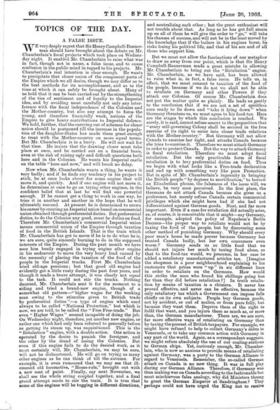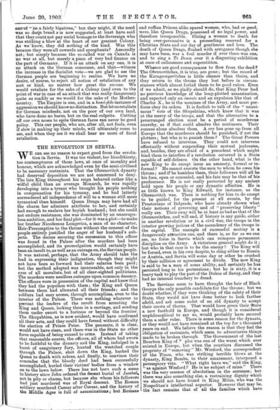TOPICS OF THE DAY.
A FALSE ISSUE.
WE very deeply regret that Sir Henry Campbell-Banner- man should have brought about the debate on Mr. Chamberlain's fiscal projects which took place on Wednes- day night. It enabled Mr. Chamberlain to raise what was in fact, though not in name, a false issue, and to cause confusion in the public mind in regard to his projects. Mr. Chamberlain's real intention is clear enough. He wants to precipitate that closer union of the component parts of the Empire which we all desire, though we may differ as to the best methods for its accomplishment, and as to the time at which it can safely be brought about. Many of us hold that it can be best carried out by the strengthening of the ties of sentiment and of loyalty to the Imperial idea, and by avoiding most carefully not only any inter- ference with the fiscal independence of the Colonies and the Mother-country, but also any attempt to force the young, and therefore financially weak, nations of the Empire to give heavy contributions to Imperial defence. We hold, further, that the carrying out of schemes for closer union should be postponed till the increase in the popula- tion of the daughter-States has made them great enough to treat with the Mother-country on more equal terms. But Mr. Chamberlain is in a hurry. He will not wait for that time. He insists that the drawing closer must take place at once, and be carried out on a financial basis, even at the risk of raising ugly and difficult questions both here and in the Colonies. He wants his Imperial castle on the table "here and now," and will brook no delay.
Now when Mr. Chamberlain wants a thing, he wants it very badly; and if he finds any tendency in his project to stick, he at once looks about for some engine that will move it, and quickly. And if one engine will not move it, he determines at once to go on trying other engines, in the confident belief that at last he will find one powerful enough. If he cannot get a thing to work in one way, he tries it in another and another in the hope that he will ultimately succeed. At present he is determined to crown his career by creating an Imperial union based on commercial union obtained through preferential duties. But preferential duties, to do the Colonies any good, must be duties on food. Therefore Mr. Chamberlain's commercial Imperial union means commercial union of the Empire through taxation of food in the British Islands. That is the train which Mr. Chamberlain has got to move if he is to do what he is, we are sure, quite sincerely burning to do in the supposed interests of the Empire. During the past month we have seen him busily engaged in trying engine after engine in his endeavour to move the very heavy load caused by the necessity of placing the taxation of the food of the people in the Imperial trucks. First Mr. Chamberlain tried old-age pensions ; but that good old engine had evidently got a little rusty during the past four years, and though it made a brave attempt, it was clearly not equal to the task. It could not stir the trucks. Nothing daunted, Mr. Chamberlain sent it for the moment to a siding and tried a brand-new engine, though of a somewhat old pattern—" higher wages for the working man owing to the stimulus given to British trade by preferential duties "—a type of engine which used always to be called "National Protection," but which is now, we are told, to be called the "Free Free-trade." But even "Higher Wages" seemed incapable of doing the job. On Wednesday night, therefore, yet another new engine, or rather one which had only been referred to generally before as getting its steam up, was requisitioned. This is the " Retaliation " engine, with a double action. One action is operated by the desire to punish the foreigner, and the other by the dread of losing the Colonies. But even if this engine fails to do the desired work, as it most certainly will, Mr. Chamberlain, we may be sure, will not be disheartened. He will go on trying as many other engines as he can think of till the autumn. For example, it is even rumoured that we may see that ill- omened old locomotive, "Home-rule," brought out with a new coat of paint. Finally, say next November, we shall see the whole string coupled together, and a final grand attempt made to stir the train. It is true that some of the engines will be tugging in different directions, and neutralising each other ; but the great enthusiast will not trouble about that. As long as he has got full steain up on all of them he will give the order to "go," will take his chances of success, and will not be in the least moved by the knowledge that if the boilers in his engines burst, he risks losing his political life, and that of his son and of all those who support him.
But we must not allow the fascinations of our metaphor to draw us away from our point, which is that Sir Henry Campbell-Bannerman made a great mistake in allowing Mr. Chamberlain to bring out the "Retaliation" engine. Mr. Chamberlain, as we have said, has been allowed to raise what is, in fact, a false issue. He tells us, in effect, that we must consent to taxation of the food of the people, because if we do not we shall not be able to retaliate on Germany and other Powers if they attack our Colonies. Of course Mr. Chamberlain does not put the matter quite so plainly. He leads us gently to the conclusion that if we are not a set of spiritless curs ready to lie down and "take it lying down" when Germany threatens us, we must agree to his food-tax. Here are the stages by which this conclusion is reached. We surely, it is said, cannot refuse assent to the proposition that "every self-governing Colony shall be secured in the free exercise of its right to enter into closer trade relations with the Mother-country." But Germany will not allow Canada to exercise her right, and attacks Canada because she tries to exercise it. Therefore we must attack Germany in order to protect Canada. But the way to attack Germany is fiscal retaliation. Therefore we must adopt fiscal retaliation. But the only practicable form of fiscal retaliation is to levy preferential duties on food. Thus we begin with what looks like a Free-trade declaration and end up with something very like pure Protection. But in spite of Mr. Chamberlain's ingenuity in bringing the British people " by degrees to mortification," to borrow an Elizabethan phrase, the falseness of the issue will, we believe, be very soon perceived. In the first place, the Germans do not attack Canada because she gives us a preference, but merely refuse Canada certain commercial privileges which she might have had if she had not differentiated against German goods. Next, and far more important. Even if a case for retaliation did actually arise, as, of course, it is conceivable that it might—say Germany, for example, adopted the policy of Napoleon's Berlin Decrees—the proper way to retaliate would not be by taxing the food of the people, but by discovering some other method of punishing Germany. Why should every poor man's home be made poorer because Germany has treated Canada badly, but her own consumers even worse ? Germany sends us so little food that we should not injure her much by taxing food alone, so that to the food-tax would, we presume, in her case be added a retaliatory manufactured articles tax. [Imagine the shopman in a poor neighbourhood explaining to his customers that prices were " up " in six different lines in order to retaliate on the Germans How would this strike the man who found his shillings going less far than they did before retaliation ?] In truth retalia- tion by means of taxation is a chimera. It never has proved effective, and never can be effective, because the only retaliatory tax which a Government can impose falls chiefly on its own subjects. People buy German goods, not by accident, or out of malice, or from pure folly, but because they want them. Deprive them of the right to fulfil that want, and you injure them as much as, or more than, the German manufacturer. There are, we are sure, far more effective ways of retaliating on Germany than by taxing the poorest of British taxpayers. For example, we might have refused to help to collect Germany's debts in Venezuela, or to take any common action with Germany in any part of the world. Again, as a correspondent suggests, we might refuse absolutely the use of our coaling-stations to German ships. Yet, curiously enough, Mr. Chamber- lain, who is now so anxious to provide means of retaliating against Germany, was a party to the German Alliance in regard to Venezuela. Remember, the so-called German attack on Canada is no new thing. It was in full play during our German Alliance. Therefore, if Germany was then making war on Canada according to the fashionable but most mischievous false analogy, why did Ministers throng to greet the German .Emperor at Sandringham? They perhaps could not have urged the King not to Melva onirof "he a fairly bigatives," but they might, if the need. was so desin bread s is now suggested, at least have said that they could not pay social homage to the Sovereign who was striking a blow at the heart of our greatest Colony. As we' know, they did nothing of the kind. Was this because they were all cowards and sycophants? Assuredly not; but simply because the so-called war on Canada is no war at all, but merely a piece of very bad finance on the part of Germany. If it is an attack on any one, it is an attack on the German consumer, and, that—witness the increase in the Socialist vote—we are glad to see the German people are beginning to realise. We have no desire, of course, to reject all notion of retaliation of any sort or kind, no matter how great the excuse. We would retaliate for the sake of a Colony (and even to the point of war in case of an attack that was really dangerous) quite as readily as we would for the sake of the Mother- country. The Empire is one, and in a bonci-fide instance of aggression we should know no distinction. But let us retaliate for German misdeeds, not on the poor of our own land, who have done no harm., but on the real culprits. Cutting off our own noses to spite German faces can never be good. policy. This our people, who are, after all, not fools, even if slow in making up their minds, will ultimately come to see, and when they see it we shall hear no more of fiscal retaliation.











































 Previous page
Previous page